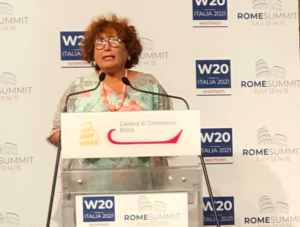“If we don’t value women, the world won’t grow” says director of ISTAT
 “Women are half of the world; they are not a minority to be given crumbs and equality. If we do not value women, the world will not be able to grow”. So Linda Laura Sabbadini, director of the ISTAT -Italian National Institute of Statistics and pioneer of gender studies, who last week lead the W20 Women Rome Summit.
“Women are half of the world; they are not a minority to be given crumbs and equality. If we do not value women, the world will not be able to grow”. So Linda Laura Sabbadini, director of the ISTAT -Italian National Institute of Statistics and pioneer of gender studies, who last week lead the W20 Women Rome Summit.
Entirely dedicated to enhancing the role and contribution of women, the three- day historical event, which for the first time was hosted in Italy, involved many high-profile figures from the world of institutions, entrepreneurship and culture. Among the protagonists of the inaugural session of the summit, taking place at the Temple of Hadrian, the president of the European Commission Ursula von der Leyen.
“As it is well known – said Sabbadini in a recent interview with Pagine Ebraiche – the G20 is often focused on issues of an exclusive economic nature. However, the pandemic modified the scenario a bit. The answers that the powerful leaders of the word will be asked, can no longer disregard environmental and social evaluations and interventions”. It is here, she stressed, “that we at Women20 come into play to ensure a global gender-equal approach”.
In Italy, she said, the epidemic entered into an already difficult situation, characterized by a partial and non-exhaustive recovery from the inequalities triggered by the previous economic and financial crisis. Poverty more than doubled and tripled for children and young people. In the labor market, where the differences between the north and the south of the country were already significant, the gap has become even more pronounced.
For women in particular, Sabbadini reflected, “the situation is dramatic: they are the first to pay for the effects of the crisis”. This also because, in Italy as in rest of the world, the service industry was the hardest hit by the pandemic and women were more present in it than men “and in a condition of evident precariousness already well before Covid”.
“The truth – she said – is that the issue of gender equality, in Italy, has never been too fashionable and we all pay for the consequences of this lack and inability to see. Now, with Covid, even more”. This is no form of resignation, however. “The opportunities for leaving a mark exists. The gap to be filled is that of awareness. Women stand out for their creativity and strength in all sectors. We’ll make it”.
Among her models, the great mathematician Emma Castelnuovo (1913-2014). “I had the privilege of having her as a teacher. It is she who made me fall in love with this subject, with her innovative and stimulating methods. She taught us by playing, removing that cultural block which unfortunately has always caused serious damage in Italy. Mathematics is logic, intuition, creativity. Learning it from Emma was a gift”. Sabbadini says she is proud “to have been her pupil, as was my mother at the Jewish school where she taught after the promulgation of racist laws and my younger brother”. A figure, she says, that remains “unforgettable”.
